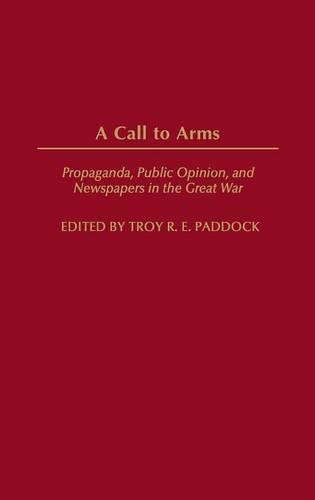
A Call to Arms: Propaganda, Public Opinion, and Newspapers in the Great War
(Hardback)
Publishing Details
A Call to Arms: Propaganda, Public Opinion, and Newspapers in the Great War
By (Author) Troy Paddock
Bloomsbury Publishing PLC
Praeger Publishers Inc
30th December 2004
United States
Classifications
General
Non Fiction
First World War
Political control and freedoms
940.488
Physical Properties
Hardback
224
Width 156mm, Height 235mm
482g
Description
The first work to provide a comparative look at how newspapers in England, France, Russia, Germany, and Austro-Hungary explained the war World War I highlighted the influence of newspapers in rousing and maintaining public support for the war effort. Discussions of the role of the press in the Great War have, to date, largely focused on atrocity stories. This book offers the first comparative analysis of how newspapers in Great Britain, France, Russia, Germany, and Austria-Hungary attempted to define war, its objectives, and the enemy. Presented country-by-country, expert essays examine, through the use of translated articles from the contemporary press, how newspapers of different nations defined the war for their readership and the ideals they used to justify a war and support governments that some segments of the press had opposed just a few months earlier. During the opening months of the war, government attempts to influence public opinion functioned in a largely negative fashion - for example, the censoring of military information and of criticism of government policies. There was little effort to provide a positive message to sway readers. As a result, newspapers had a relatively free hand in justifying the war and the reasons for their nation's involvement. Partisan politics was a staple of the pre-war press; thus, newspapers could and did define the war in terms that reflected their own political ideals and agenda. Conservative, liberal, and socialist newspapers all largely supported the war (the ones that did not were shut down immediately), but they did so for different reasons and hoped for different outcomes if their side was victorious. Part of the Perspectives on the Twentieth Century series The comparative analysis of newspaper attitudes to World War I in five of the main belligerent powers Includes and analyzes translations of contemporary newspaper articles
Author Bio
TROY R. E. PADDOCK is Assistant Professor of History at Southern Connecticut State University where he teaches modern German and European history.
